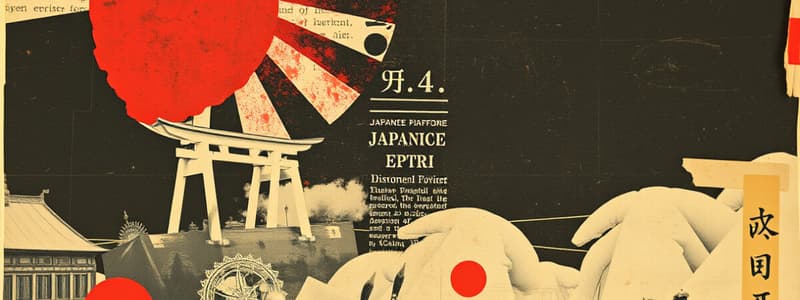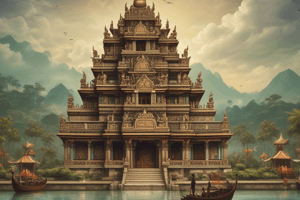Podcast
Questions and Answers
What was the Japanese Empire's emergence attributed to?
What was the Japanese Empire's emergence attributed to?
- Segregation
- Isolationism
- Rapid industrialization and militarization (correct)
- Fascism
What is isolationism?
What is isolationism?
A national policy of avoiding involvement in world affairs.
Who used fascism to create a totalitarian government in Germany?
Who used fascism to create a totalitarian government in Germany?
Adolf Hitler
What was a significant factor in the War in Europe prior to World War II?
What was a significant factor in the War in Europe prior to World War II?
What event led America to declare war on Japan?
What event led America to declare war on Japan?
What ended American isolationism in relation to World War II?
What ended American isolationism in relation to World War II?
What did Hitler advocate for concerning the German peoples in Europe?
What did Hitler advocate for concerning the German peoples in Europe?
What was critical for protecting mainland America during combat in the Pacific?
What was critical for protecting mainland America during combat in the Pacific?
What cities did the United States drop atomic bombs on?
What cities did the United States drop atomic bombs on?
What happened to unemployment due to war production for World War II?
What happened to unemployment due to war production for World War II?
What did the Bracero Program accomplish?
What did the Bracero Program accomplish?
How many women joined the workforce to replace men's jobs during World War II?
How many women joined the workforce to replace men's jobs during World War II?
What were the WAC, WAVES and WASPS?
What were the WAC, WAVES and WASPS?
How many African Americans fought in World War II?
How many African Americans fought in World War II?
The military during World War II was strictly segregated with no discrimination issues.
The military during World War II was strictly segregated with no discrimination issues.
What did Japanese internment during WWII involve?
What did Japanese internment during WWII involve?
What was the U.S. approach to the Holocaust?
What was the U.S. approach to the Holocaust?
What is the United Nations?
What is the United Nations?
The G.I. Bill was a law passed in _____.
The G.I. Bill was a law passed in _____.
Flashcards are hidden until you start studying
Study Notes
The Japanese Empire
- Japan emerged as a world power post-First Sino-Japanese War, establishing a colonial empire through rapid industrialization and militarization.
- Key events shaping Japan’s power included the Boxer Rebellion, the Russo-Japanese War, and involvement in World War I.
Isolationism
- A national policy characterized by the avoidance of involvement in foreign affairs.
The Nazis
- Adolf Hitler utilized fascism to forge a totalitarian regime, uniting Germany during the 1930s.
The War in Europe
- Major European powers struggled with the consequences of World War I, compounded by the global economic crisis leading to chaos.
- Hitler's aggressive actions instigated conflict across the continent.
Pearl Harbor
- Japan launched a surprise attack on the American naval base in Hawaii, prompting the U.S. to declare war on Japan.
- This led to Germany and Italy declaring war on the U.S., marking America’s entry into the conflict on two fronts.
American Entry Into World War II
- Isolationism ended post-Pearl Harbor, as Japan attacked multiple U.S. territories in the Pacific, escalating the conflict.
The Invasion of Europe
- Hitler sought to unify all German-speaking peoples and acquire Lebensraum (living space) primarily in Eastern Europe for future prosperity.
Combat in the Pacific
- American aircraft carriers and submarines created significant challenges for Japan’s navy.
- The transition from isolated raids to large-scale battles for U.S. forces proved costly as they faced a steep learning curve.
Atomic Bombs
- The United States dropped atomic bombs on Hiroshima and Nagasaki, leading to Japan's surrender and conclusion of World War II.
Soldier's Experiences
- Nearly 18 million Americans served in World War II; many volunteered after Pearl Harbor, while over 10 million were drafted.
- Volunteers had the option to choose their assignments, often enlisting to avoid draft conscription.
The End of the Great Depression
- War production during WWII significantly reduced unemployment rates as factories shifted to weapons and equipment manufacturing.
The Bracero Program
- U.S. labor agents recruited thousands of Mexican farm and railroad workers, encouraging emigration from Mexico.
Women in the Workforce
- With men deployed overseas, about one million women entered the workforce, with an additional eight million transitioning to higher-paying industrial jobs.
Women in Military
- The WAC (Women Army Corps) and WAVES (Women Accepted for Volunteer Emergency Service) along with WASPS (Women Airforce Service Pilots) represented women's contributions to military efforts.
African American Service Members
- Over one million African Americans served in WWII, primarily in segregated, non-combat roles commanded by white officers.
Segregation in the Military
- Military practices strictly segregated troops by race, perpetuating discrimination faced by African Americans upon returning home.
Japanese Internment
- Around 110,000 Japanese and Japanese Americans were forcibly relocated to internment camps during WWII, with only about 10,000 allowed to resettle independently.
America's Approach to the Holocaust
- Proposals to bomb concentration camps or railroads were dismissed by U.S. military and civilian officials, sparking debate on the effectiveness and potential consequences of such actions.
The United Nations
- Established after WWII, this international organization aims to foster peace, security, and cooperation globally.
The G.I. Bill
- Passed in 1944, the G.I. Bill provided various benefits for returning World War II veterans, enhancing their transition to civilian life.
Studying That Suits You
Use AI to generate personalized quizzes and flashcards to suit your learning preferences.





